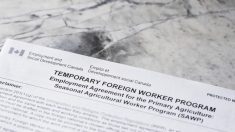Federal Finance Minister Chrystia Freeland’s latest Fall Economic Statement offers to take some of the reporting burden off certain farmers and other Canadians when filing for exemptions from the national Underused Housing Tax (UHT).
The federal finance department on Nov. 16 posted its legislative and regulatory proposals for changes to the UHT online and has teed up a consultation period for those proposals. Canadians and other stakeholders and organizations are asked to submit comment via email by Jan. 3, 2024.
Read Also

Canada, India team up on new pulse protein centre
Saskatchewan announced in a press release on March 3, 2026 it will team up with India on a proposed new pulse protein centre of excellence north of New Delhi.
The UHT — an annual, one per cent tax on ownership of vacant or “underused” housing in Canada which took effect Jan. 1 last year — has led a clutch of national farm groups to call on Ottawa for a blanket exemption for farmers from having to file a UHT return.
Canadian citizens and permanent residents are exempt from the UHT, but many corporations are not. That means a farm operating via a Canadian corporation or partnership with a residential property is required to file a UHT return each year, even if other exemptions mean no UHT will be owed.
Furthermore, the farm groups said, while some forms of farm worker housing, such as a bunkhouse or mobile home, are exempt, a detached house used for worker housing is not. That rule, they said, amounts to a penalty on higher-quality housing options for farm workers.
Freeland’s proposal would see certain types of corporations and partnerships added to the list of “excluded owners” for the purpose of UHT reporting — which means those entities “would no longer have UHT reporting obligations.”
The proposal would exclude:
- a “specified Canadian corporation” — that is, a Canadian corporation in which foreign individuals/corporations hold less than 10 per cent of votes or equity;
- any partner of a “specified Canadian partnership” — generally, a partnership whose partners are exclusively “Canadian”; and/or
- any trustee of a “specified Canadian trust” — generally, a trust whose beneficiaries are exclusively “Canadian.”
Freeland’s proposal would also set up a new UHT exemption for “residential properties held as a place of residence or lodging for employees.”
That new exemption would cover residential properties anywhere in Canada, except those in a census metropolitan area or “a census agglomeration having 30,000 or more residents.”
Those changes are expected to apply for the 2023 calendar year and subsequent years, the government said.
Not retroactive
Federal Revenue Minister Marie-Claude Bibeau tweeted Wednesday on X that the fall economic statement “addresses major irritants” of the UHT, particularly by broadening its definition of “excluded owner.”
That move will “eliminate the need to file (UHT) returns for many Canadian businesses, such as agricultural businesses,” said Bibeau, a former federal agriculture minister.
However, she noted in response to other X users’ replies on Wednesday, the changes will not be retroactive to the 2022 tax year.
UHT filers have been granted two “transitional” extensions to file for the 2022 tax year without penalty. The first, announced in late March, extended the deadline to Oct. 31; then, on Oct. 31, another extension was granted, giving UHT filers until April 30, 2024 to file their 2022 UHT returns.
However, the government said, UHT returns for the 2023 calendar year will also need to be filed by the normal deadline of April 30, 2024, to avoid penalties and interest.
That said, Freeland’s proposed changes to UHT rules also call for reduced penalties for those who fail to file UHT returns by the annual deadline — and would make those reductions retroactive to the 2022 tax year.
Those penalties — now $5,000 per failure for individuals, and $10,000 per failure for corporations — would be cut to $1,000 and $2,000 respectively. — Glacier FarmMedia Network
















